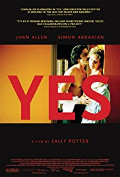
Directed by
Sally Potter
100 minutes
Rated M
Reviewed by
Sharon Hurst

Yes
Synopsis: She (Joan Allen) is a scientist in a loveless marriage to Anthony (Sam Neill). She meets He (Simon Akbarian), a doctor who has left his native Lebanon and now works as a waiter and cook. They embark upon a passionate affair but soon politics and religious background begin to intrude upon their relationship.This film will not be everyone's cup of tea. Some critics are muttering that it is pretentious and gimmicky. For me that is to miss its basic thrust, which is that of a powerful love story, with an important philosophical and political content presented in a way that dares to be different from the many formulaic and prosaic offerings of mainstream film. Add to this a collection of oddball kitchen hands who work with He, a dying Communist aunt, and the fact that the entire film is spoken in iambic pentameter (the style of verse which Shakespeare wrote), and you have a recipe for one of the most extraordinary films of the year. Amazingly, the actors speak their lines so naturalistically that it takes quite a while to even twig to the fact that they are speaking in verse, and once you do latch on to it, there is a real fascination in following where the words rhyme and how unobtrusively they do so.
The film opens with the maid giving a monologue on the role of dirt in people's lives; what it reveals and how it never goes away - it just moves around. The plot cuts immediately to the chase and we see just how unhappy She is with her husband's womanising, and how quickly He picks up on her pain and these two find solace in each other's arms. The palpable eroticism and subtlety of the scenes between the lovers could teach Hollywood a thing or two.
Some of the lovers' conversations touch on deep issues of basic meaning, and the ever-present core issue of whether such different backgrounds can allow for a lasting relationship. The current hot topic of Islam and the West is wonderfully handled via a flare-up between the cooks of varying origins in the restaurant kitchen. This is then carried on to a harrowing scene between He and She in which He sees Her as a symbol of the Western oppression of his Arab world. There is also an incredibly powerful scene in which the consciousness of a dying woman is spoken aloud in verse as she demands to be grieved for.
Despite these ambitious themes the film is still firmly grounded in the archetypal love story, sweepingly carried by the superb acting of the two leads. Allen shifts seamlessly from her ice cool exterior to a role of unusual softness, while Akbarian blitzes with a smouldering Middle Eastern charm and sensuality, along with great vulnerability.
Along with some stunningly artistic cinematography and a haunting score composed by Potter, this is a film that invites me to further viewings to savour its emotional power, enjoy its language, and to better grasp its challenging themes and ideas.

Want more about this film?


Want something different?




